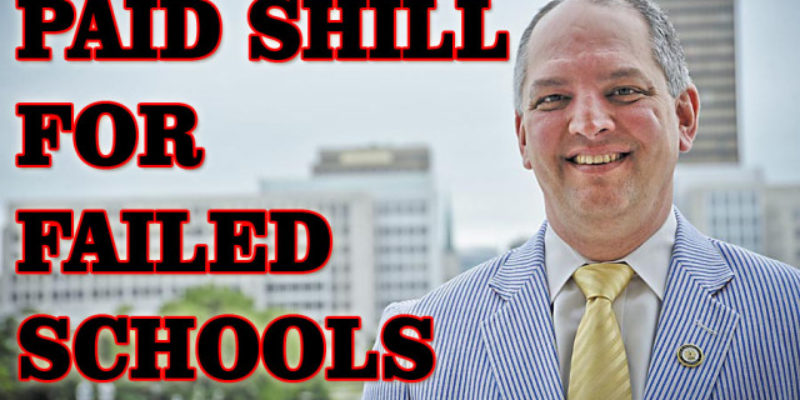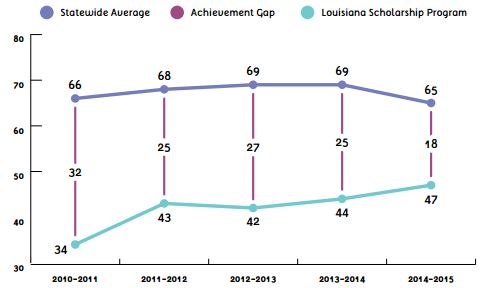There’s another study out which says that Louisiana’s voucher program hurts the academic performance of the kids using it, though one has to wonder how objective this thing actually is. The first such study focused only on the first school year after the program, which allows students from public schools rated as failing by the state to take advantage of a $5,000 voucher to attend private schools, when there was more data available, and came to the conclusion the program was a failure because the voucher kids didn’t do well in the first year.
This one has two years of data, and it says the same thing but not all that credibly…
“We find the program had a negative impact on participating students’ academic achievement in the first two years of its operation, most clearly in math,” according to the study issued Monday.
The review was done by the Education Research Alliance for New Orleans, which is based at Tulane University, and a University of Arkansas education center called the School Choice Demonstration Project.
The results are sure to be part of any debate during the 2016 regular legislative session to put new restrictions on the program, which costs the state about $42 million per year.
Going deeper, one wonders about the conclusions.
The Tulane study released on Monday focused on 2012-13 and 2013-14, with some of the same conclusions as the national snapshot.
“Our estimates indicate that an LSP (Louisiana Scholarship Program) scholarship user who was performing at roughly the 50th percentile at baseline fell 24 percentile points below their control group counterparts in math after one year and 8 percentile points below in reading,” according to the report.
“In year 2, LSP scholarship users continued to score below their control group counterparts by 13 percentile points in math,” it says.
Any changes in the second year of reading were unclear.
So these kids, who made the jump from a public school to a private one and were put in a completely different environment with a new set of rules, kids, bus ride and all the other attendant things surrounding a new school, generally struggled academically. That’s hardly a surprise. But basically half of the drop in achievement was erased from the first year to the second.
That doesn’t indicate failure, it indicates improvement. As those kids are getting used to the new school they’re doing better.
But here’s how it’s being presented…
The report said there are several possible explanations for the results.
Private schools have been under no pressure to align to state test standards, and the private schools that agreed to accept voucher students may have not been prepared for students with such academic and financial needs.
In addition, less than one-third of private schools statewide agreed to take part in the voucher program in its first year.
State rules and other hurdles “may have played a role in preventing the private school choice program from attracting the kind of private schools that would deliver better outcomes to their participants,” the report says.
And, the punch line…
Steve Monaghan, president of the Louisiana Federation of Teachers and a voucher critic, said during a panel discussion of the report Monday that statewide vouchers were launched in 2012 with a brilliant marketing campaign.
“Look, this was bathed in politics and politics shall make it better,” Monaghan said.
Interestingly, the state Department of Education had its own report on the voucher program, the 2015 Louisiana Nonpublic School Choice Annual Report, which came to a bit different conclusion. The Louisiana Federation for Children put out a press release discussing it in completely different terms than the Advocate’s piece on the Tulane voucher study does…
“Now, four years into the statewide expansion of the program, we are seeing significant academic gains. As a result of a robust accountability system, more students are attending higher performing schools which has translated to overall increases in program-wide scholarship student achievement,” said Ann Duplessis, president of the Louisiana Federation for Children.
“These academic gains are reflected in the Louisiana Department of Education’s 2015 Louisiana Nonpublic School Choice Annual Report:
- The Louisiana Scholarship Program has closed the achievement gap with the statewide average by almost half (44 percent gap reduction) over the last five years for students in grades 3-8 achieving at least “Basic” proficiency.
- Additionally, the report notes that the percentage of students in grades 3-8 receiving nonpublic school scholarships and achieving “mastery” on state assessments increased 4 percentage points, compared to a 3 percentage point increase for all students statewide. Likewise, the percentage of Scholarship students achieving at least “basic” increased 3 percentage points, compared to a 4 percentage point dip statewide.
- Program-wide, the Scholarship program’s increases in student achievement outpaced the majority of districts. If the Louisiana Scholarship Program were considered a school system with a system-wide performance score, the Louisiana Scholarship Program’s 4.7-point growth from 54.3 in 2014 to 59.0 in 2015 would have ranked 9th among all school systems for annual performance improvement.
One of the things that was anticipated as the voucher program was contemplated was that as a free market for education developed and there was more information available to consumers for them to choose schools, you’d see a drive toward higher achievement as market forces and competition began to take hold.
Duplessis also addressed the Tulane study…
“While the authors of this report found the Louisiana Scholarship Program had a negative impact on participating students’ academic achievement in the first two years of its operation, it is important that we understand the conditions in which the program operated in 2012.
“The statewide expansion of the Louisiana Scholarship Program occurred at the end of the Louisiana State Legislative Session in June of 2012. A robust accountability system had not been established before schools began enrolling students. In addition, participating schools did not receive information on their incoming students until later that summer, giving the schools little time to prepare for their new students. Historically, private schools have not had to close achievement gaps within their student population so remediation was a challenge especially when lacking new student academic data.
“Notably, all of these students previously attended failing and underperforming schools. They arrived at their Scholarship schools with academic deficits and were assessed in the first year before academic gaps could be closed by the new school.”
“As the study pointed out, students entering the Scholarship program in 2012-13 were performing approximately 20-percentile points below the state average. These students swiftly entered a new school setting where they had to make new friends, acclimate to new teachers, adjust to a new school culture, and in most cases learn a new curriculum. It is important to note that in the students second year in the program, they began to make academic gains once they adjusted to their new educational environment.
It starts to become apparent that studies focusing on the first year or two of academic results when data is available up to the third year might have an agenda. For example, here’s a graph from the Department of Education study…
Understand that in 2010-11 and 2011-12 the voucher program was only available in Orleans Parish, which started accepting voucher kids in 2008-09. So as that program matured you began to see some very significant movement for those kids toward the statewide average. Then in 2012-13 the program went statewide, and all the first-year voucher kids had the effect of stalling that progress. But in subsequent years you’re seeing that progress continue as the market starts to sort itself out.
The shorter the time frame for these studies the worse the program is going to look, and that’s the way the teacher unions and educrats want it. Naturally the Advocate is happy to play along. But that’s not what’s actually happening with the voucher program.
To use an analogy that’s a little far afield, if you look at the economic performance of Russia a year or two following the fall of the Soviet Union you might conclude that communism is a better system than capitalism is. But while Russia is a basket case of a country even today there is no question it’s economically better off than it was in the mid-1980’s. And in the old Soviet bloc, particularly in Eastern Europe and the Caucasus, there is no comparison.
Meanwhile, the Department of Education study found that 91.2 percent of the voucher parents are satisfied with their schools, 99.1 percent think their new school is satisfactorily safe, which is a bit different feel than the failing public schools they came from offered, and 98.4 percent felt a sense of customer satisfaction in terms of the service the new school offered. None of that was included in the Advocate piece.
Nor would you expect that. The narrative being pushed is that the voucher program is a failure and the $42 million the state spends on it, despite the fact that money is LESS than what the state would have spent on the voucher kids were they to be attending their old failing public schools, is waste that could be cut. It’s not a credible budgetary argument but it’s not intended to be; it’s an argument intended at stamping out the program and consolidating control over those kids by the unions and bureaucrats at the school boards.
Recognize it as that, and you’ll see why those studies are presented the way they are.
Advertisement
Advertisement


